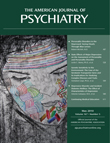One of the oldest distinctions in psychiatry is that between state and trait—between a transient or time-limited event, such as a panic attack or a depressive episode, and an enduring, even lifelong, condition such as schizophrenia, mental retardation, or a personality disorder. This distinction is further complicated in that some states may recur, as is common with depression, so that the predisposition to the state becomes a trait, while some traits may be found on closer examination to have variable and unpredictable courses, with the stability and outcome less predictable than the pure notion of trait would suggest, as has been reported in recent studies of personality disorders.
An individual may have a state and trait at the same time—that is, state and trait can be comorbid. The organization of DSM-III, DSM-III-R, and DSM-IV into axis I and axis II was in great part intended to highlight such comorbidities and call clinical attention to them. One of the commonest comorbidities in psychiatry is between a depressive episode and a personality disorder (
1). In this issue, Morey et al. (
2) report that about two-thirds of their patients with personality disorders had comorbid depressive episodes, consistent with the findings of others. However, this raises a state-trait dilemma in the methodology of diagnosis and assessment that runs through the personality disorder-depression literature. Does a coexisting depressive episode influence the validity of a simultaneous personality disorder diagnosis? In other words, does the depressed patient's depressed view of self and world lead to false positive diagnoses of personality disorders, diagnoses that will disappear after the depression has ended?
This potential problem was recognized many years ago, and there has been a series of attempts to address it. Self-report questionnaires have been reported to be more valid when patients are given clear instructions to describe their usual or premorbid characteristics rather than their current ones (
3). Some personality trait assessments have been reported to be affected by depressive episodes at the time of evaluation while others were not (
4). Collateral informants can supplement information provided by the patient (
5). Interviews by experienced clinicians seem superior to self-reports, and training of interviewers improves the results further (
6,
7). The Morey et al. study represents a major addition to this literature by examining the long-term outcome and diagnostic stability of patients with depression, personality disorder, or both. They studied 433 patients from four sites over a 6-year period: 73 with depression alone, 119 with personality disorder alone (and no history of previous depression), and 241 with both depression and personality disorder. The patients with personality disorders had one of four disorders—schizoid (cluster A), borderline (cluster B), avoidant, or obsessive-compulsive (both cluster C). These disorders had comparable stability over a 6-year period and had comparably high rates of comorbidity with depression (67%). Personality disorders were evaluated by both questionnaires and interviews.
Morey et al. found that depressive states did not alter the validity of personality disorder diagnoses. Personality pathology diagnosed during a depressive episode persisted over time and endured after the depressive episode had ended; it seemed in every regard similar to personality pathology diagnosed in the absence of a depressive episode. Clinicians who know how to diagnose personality pathology should be able to do so whether or not the patient is simultaneously depressed.
The clinical importance of the question is underlined by Morey and colleagues' finding that while only 8% of the depressed patients without personality disorders remained depressed at 6-year follow-up, 29% of the depression-plus-personality disorder group did so, suggesting either that the persistent symptoms were a manifestation of the personality disorder or that the personality disorder interfered with recovery from depression. The latter interpretation is a recurrent theme in the literature (
8–
11).
The assessment of personality is an important part of the assessment of any depressed patient. It can be made during the depressed state and is relevant to the prediction of prognosis and treatment response.

